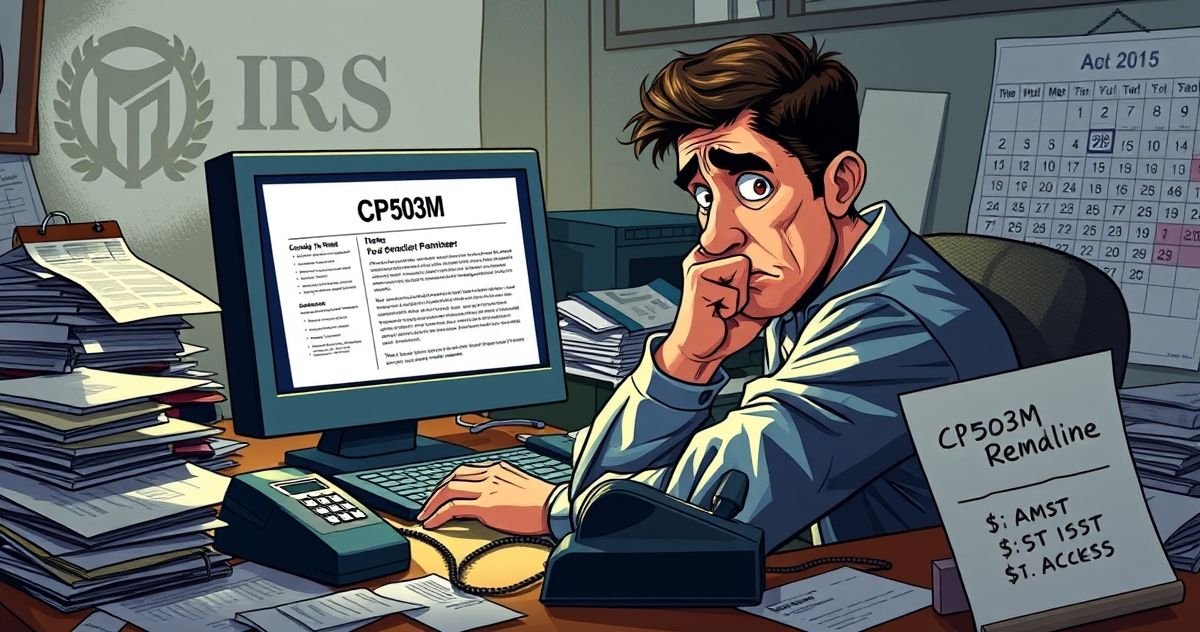Understanding the CP503M Reminder
The CP503M Reminder is an official notice issued by tax authorities, typically within the United States, to alert taxpayers of an outstanding balance on their tax accounts. Generally, it serves as a critical reminder, prompting individuals or businesses to take swift action to settle their debts before additional charges or penalties are imposed.
What is the CP503M Reminder?
The CP503M is essentially a follow-up notice after a taxpayer has received previous notices (like the CP501 or CP502) regarding unpaid taxes. This reminder notifies the taxpayer that their outstanding balance remains unpaid and informs them of the need to address the issue promptly to avoid further legal complications or added financial penalties. The primary purpose of the CP503M is not only to inform the taxpayer of the delinquency but also to emphasize the importance of resolving the issue immediately to maintain good standing with tax authorities.
Key Features of the CP503M Notice
- Balance Information: The notice specifies the total amount due, including any accrued interest and penalties since the initial due date.
- Deadline for Payment: The CP503M will specify a deadline by which the taxpayer must address the debt to avoid further action.
- Payment Instructions: Detailed information on how to pay the outstanding balance, including payment methods such as online payments, checks, or money orders, is provided.
- Potential Consequences: The CP503M outlines possible consequences of non-payment, including increased penalties and interest, collection actions, or additional legal procedures.
- Contact Information: The notice usually includes contact details for the taxpayer to reach out if they have questions or need assistance in settling the balance.
Relevant Filing and Compliance Requirements
The CP503M Reminder is a part of the tax authority’s efforts to ensure taxpayers comply with their financial obligations. By reminding taxpayers of their outstanding balances, the notice serves as a nudge toward fulfilling these requirements. Failure to comply with this notice could result in several repercussions including:
- Increased Financial Liability: Continued neglect of the outstanding balance will lead to additional interest charges and penalties. These accumulated amounts can significantly increase the original debt.
- Escalation to More Severe Notices: If the taxpayer does not respond to the CP503M, the authorities might issue more severe notices, such as the CP504 or a notice of Federal Tax Lien, which carry more significant implications.
- Potential Legal Action: Non-compliance can eventually lead to legal actions including wage garnishments, bank levies, or property seizures.
Penalties or Consequences of Non-Compliance
The penalties for ignoring a CP503M Reminder can be severe and multifaceted, impacting the taxpayer’s financial health and creditworthiness. Immediate consequences of neglect might include increased interest rates on the outstanding balance, as well as additional late fees. Furthermore, long-term non-compliance can trigger the following:
- Notice of Federal Tax Lien: A lien can be filed on a taxpayer’s assets, affecting their credit score and ability to acquire loans or sell property.
- Seizure of Assets: Authorities may resort to seizing assets such as real estate, vehicles, or other valuable items to satisfy the debt.
- Wage Garnishments: Tax authorities have the legal right to collect the owed amount directly from the taxpayer’s employer by garnishing wages, often severely impacting the individual’s income.
- Legal Proceedings: Continued disregard for the CP503M may eventually lead to court action, requiring the taxpayer to resolve their debt legally and often resulting in additional costs.
Importance of the CP503M in Tax Resolution
The CP503M Reminder is a crucial part of the tax compliance process, as it provides taxpayers with an opportunity to rectify their financial obligations before more severe penalties are enforced. It serves as a catalytic point of action, urging taxpayers to manage their responsibilities proactively. By responding to the CP503M, taxpayers can:
- Avoid Additional Penalties: Taking prompt action helps avoid further penalties, saving financial resources in the long run.
- Maintain Credit Health: Immediate resolution will prevent negative entries on credit reports, maintaining the taxpayer’s creditworthiness.
- Access Negotiated Payment Plans: Tax authorities often provide options for installment agreements or offers in compromise for taxpayers who acknowledge their debts and demonstrate willingness to pay.
- Ensure Financial Stability: By addressing the issue early, taxpayers can plan for future financial stability without the looming threat of debt recovery actions.
In conclusion, the CP503M Reminder is a significant notice within the framework of tax compliance. Understanding its purpose, features, and potential impacts is vital for any taxpayer to maintain good standing with tax authorities. Given the potential severe consequences of non-compliance, addressing the CP503M promptly should be a priority for anyone who receives it, ensuring sound financial management and adherence to tax obligations.

